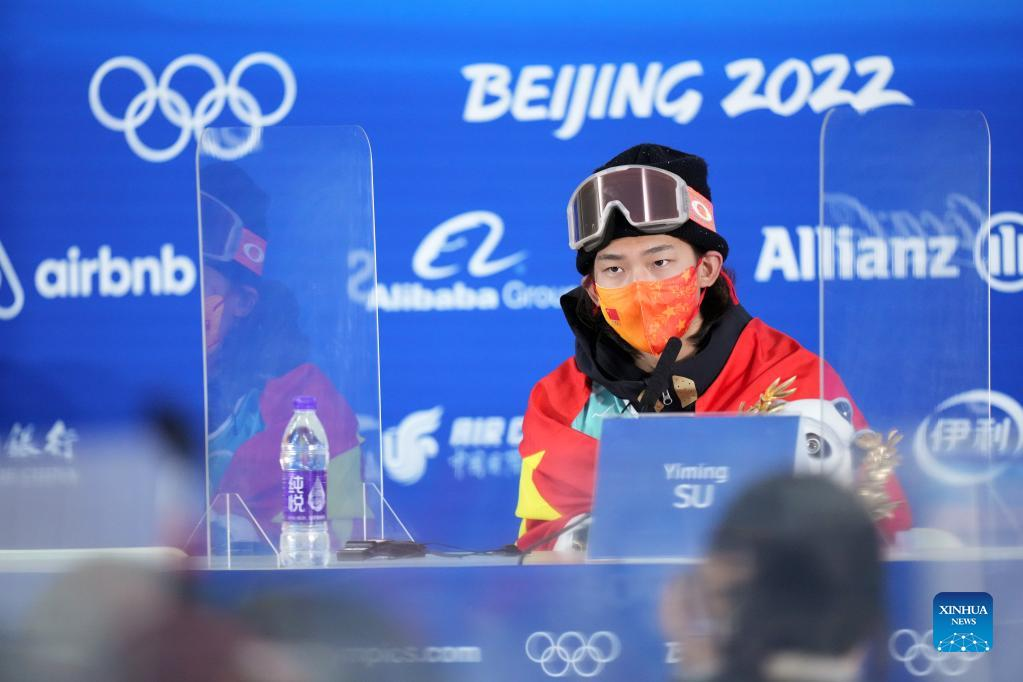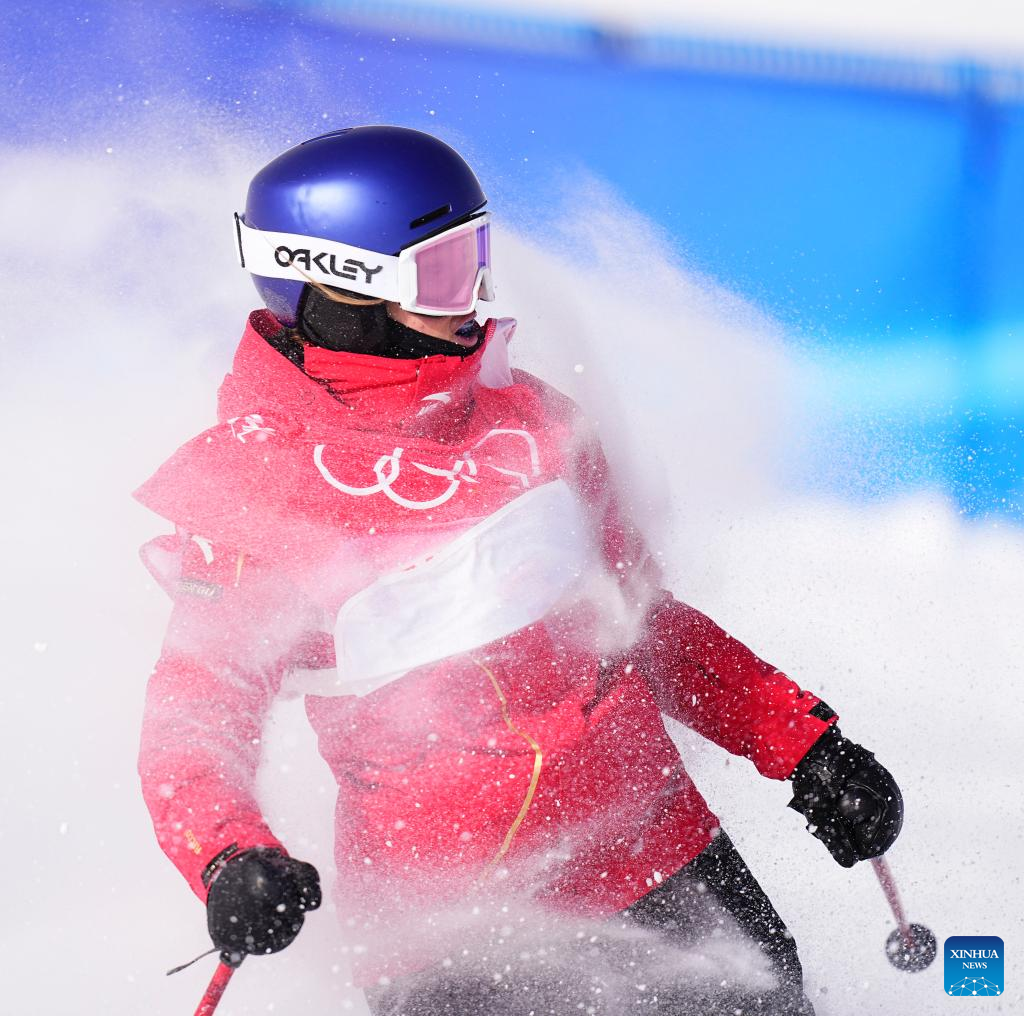China's 'snow twins' herald new generation
 0 Comment(s)
0 Comment(s) Print
Print E-mail Xinhua, February 17, 2022
E-mail Xinhua, February 17, 2022
Teenage star skiers Gu Ailing and Su Yiming once again amazed after both notched their second Olympic medals on Tuesday, triggering online discussions on the personalities, family upbringing and education of the rising GenZ.

A documentary clip of Gu, now 18, and Su, 17, exchanging their skis and snowboards went viral on social media, together with a picture of Gu standing by Su, holding their snow gear four years ago -- when few foresaw how the two joyful children would make waves not only in sports, but even introduce reflections on parenting and education in China.
"I do want to be a professional athlete, but only as long as it makes me happy," Gu said in the video shot in 2017.
Five years later at the Beijing Winter Olympics, Gu grabbed the silver medal in Tuesday's slopestyle event after winning gold in the Big Air. In the men's snowboard Big Air two hours later, Su claimed the Olympic title with a stylish performance, adding to his previous silver medal in the slopestyle event.
Chen Hong, a commentator for a Shanghai-based newspaper, underlined the strong passions behind their professional success as well as their wide recognition at home and abroad.
"Gu and Su are loved by millions as they represent the characteristics of a new generation of athletes. Apart from performing well in competitions, they really love their sport," Chen wrote.
It's hard to ignore how closely the life paths and confidence of the newborn generation came along with China's economic boom over the recent decades and active collaboration with the rest of the world.
In contrast to his forerunners, who mostly grew up in material inadequacy last century and trained in a comparatively underdeveloped environment in terms of equipment, techniques and even concepts of sports, Su started the winter sport during China's prosperous era in both economics and sports.
27-year-old Wu Dajing, the first Chinese male skater to win an Olympic gold medal in short-track speed skating, started his career on an outdoor rink with an amateur team in northeast China's Heilongjiang Province in 2004.
Back then, the 10-year-old boy could not find a standard rink at his hometown Jiamusi, a city with a population of over 2 million, nor could his family afford a pair of new skates which could cost more than one month of his father's salary.
In comparison, Su has trained overseas with world-class talents since they were teenagers, joining competitions and making friends from all over the world.
"He is very smart, focusing on what he is doing. He's well-educated and he knows what's going on, how to deal with people, and how to grow up by himself," Su's Japanese coach Yasuhiro Sato said.
"He's only 17 years old. Sometimes I feel I'm talking to a 35-year-old man," he said.
The frequent exposure to a multicultural environment has reinforced their belief that sport is not just about winning medals, but more about enjoying the sport and transcending themselves to connect to the world.

"Gu also represents the relaxing attitude of young people, daring to challenge their limits," commentator Chen wrote, adding that "in an era of prosperity," the young athletes received more tolerance from society to just simply be themselves.
"Enjoy the game and have fun," Su told his childhood friend Gu a day before the final slopestyle event, while Gu told Xinhua what she loves most about freeski is the "freedom" she feels when jumping high in the sky.
"My mission is to use sport as a force for unity, to use it to foster interconnection between countries and not use it as a device of force. That benefits everyone," Gu said.
The gold medal winner at the Big Air final immediately went to hug fellow competitor Tess Ledeux of France, who fell on her last jump to settle for silver in the event on Feb. 8.
"I wanted to tell her that a part of my gold medal belongs to her," Gu said.
Her candid way to hit back at critics also impressed a lot of people. "I'm not trying to keep everyone happy. I'm an 18-year-old girl out here living my best life and having a great time," she told a post-match press conference.
Her composure in difficult situations has won her a flood of compliments from many netizens.
"Can't help noticing how wise and well-spoken she is!" a YouTube user with the nickname Haji commented on Gu's response.
"This is a lot of pressure for an 18-year old girl," wrote another netizen, self-identifying as Alex Lazar. "But she shrugs it off like nothing. This is a true power of 18-year old boys and girls, they neither perceive nor care just how powerful and sinister are the old forces around them, they create a world of their own."
Gu is proud of her three tags as a "straight-A student," "young athlete" and "public figure," while Su is better known to the public for his stunning appearances on the big screen.
As a kid, Su starred in movies and TV series like "Tracks in The Snow Forest," and "Beijing People in Beijing," his famous role "Xiao Shuanzi" in the film "The Taking of Tiger Mountain" in 2014, was also a big hit with audiences.
Many are also impressed by his language skills, seeing how he introduced the Beijing Games snow track venue in both English and his "kawaii" Japanese in a recent video posted by his coach Sato.
"I don't want to set limits for myself," Su said, noting that he is eager to try something new and embrace more possibilities in the future.
"Maybe he can shoot his own biographical film with himself being the leading actor," a follower named "Xiao Lingqi" commented.
The stellar achievements and unconventional background of Gu and Su both in and outside of sports competition venues have increased their popularity in China with ever-growing influence.
In the past week, Gu attracted over 2.86 million new followers on Weibo, with a total of more than 5 million followers now.
Articles like "how to raise a girl like Gu Ailing" and "why can't your kids become another Su Yiming" mushroomed online. Pondering how to give their kids the best education, many Chinese parents are trying to strike a fine balance between academic study and sports training.
"When watching the young athletes, what I feel closely is their mindset of enjoying the game and challenging themselves. They are confident, open-minded, positive and calm," 32-year-old mother Yao Ran from north China's Shanxi Province told Xinhua. "I hope my child can share some of their personal traits when he grows up."
"I can see 'talent' and 'God rewards diligence' in Gu and Su," Nieng Yan, a professor at Princeton University, wrote on Weibo. "I hope teenagers can see more and more healthy and cheerful young people like them."
"I admire athletes like Gu and Su, and even more for those who grew up in material inadequacy. The two kinds of athletes are not in opposition to one another. Only see all of them, can you get the whole story of China," a netizen nicknamed "Coffee Ragdoll" wrote on Weibo.






Go to Forum >>0 Comment(s)